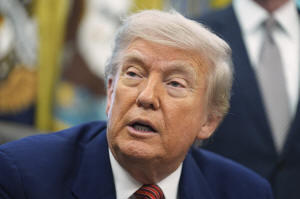Trump signs executive orders to boost nuclear power, speed up approvals
[May 24, 2025]
By MATTHEW DALY and JENNIFER McDERMOTT
WASHINGTON (AP) — President Donald Trump signed executive orders Friday
intended to quadruple domestic production of nuclear power within the
next 25 years, a goal experts say the United States is highly unlikely
to reach.
To speed up the development of nuclear power, the orders grant the U.S.
energy secretary authority to approve some advanced reactor designs and
projects, taking authority away from the independent safety agency that
has regulated the U.S. nuclear industry for five decades.
The order comes as demand for electricity surges amid a boom in
energy-hungry data centers and artificial intelligence. Tech companies,
venture capitalists, states and others are competing for electricity and
straining the nation's electric grid.
“We’ve got enough electricity to win the AI arms race with China,”
Interior Secretary Doug Burgum said. “What we do in the next five years
related to electricity is going to determine the next 50" years in the
industry.
Still, it's unlikely the U.S. could quadruple its nuclear production in
the time frame the White House specified. The United States lacks any
next-generation reactors operating commercially and only two new large
reactors have been built from scratch in nearly 50 years. Those two
reactors, at a nuclear plant in Georgia, were completed years late and
at least $17 billion over budget.
The nation's 94 nuclear reactors supply about 19% of U.S. electricity,
compared to about 60% for fossil fuels and 21% for renewables, according
to the U.S. Energy Information Administration.

Trump is enthusiastic
At the Oval Office signing, Trump, surrounded by industry executives,
called nuclear a “hot industry,” adding, "It’s time for nuclear, and
we’re going to do it very big.”
Burgum and other speakers said the industry has stagnated and has been
choked by overregulation.
“Mark this day on your calendar. This is going to turn the clock back on
over 50 years of overregulation of an industry,'' said Burgum, who
chairs Trump's newly formed Energy Dominance Council.
The orders would reorganize the independent Nuclear Regulatory
Commission to ensure quicker reviews of nuclear projects, including an
18-month deadline for the NRC to act on industry applications. The
measures also create a pilot program intended to place three new
experimental reactors online by July 4, 2026 — 13 months from now — and
invoke the Defense Production Act to allow emergency measures to ensure
the U.S. has enough uranium and other reactor fuel for a modernized
nuclear energy sector.
The orders also call for the Energy and Defense departments to assess
the feasibility of restarting closed nuclear power plants and explore
siting reactors on federal lands and military bases.
The NRC is assessing the executive orders and will comply with White
House directives, spokesperson Scott Burnell said Friday.
Jacob DeWitte, chief executive officer of the nuclear energy company
Oklo, brought a golf ball to the Oval Office. He told Trump that's the
amount of uranium that can power someone’s needs for their entire life.
“It doesn’t get any better than that,” he said, holding up the ball.
“Very exciting indeed,” Trump said.

[to top of second column]
|

President Donald Trump speaks to reporters after signing executive
orders regarding nuclear energy in the Oval Office of the White
House, Friday, May 23, 2025, in Washington. (AP Photo/Evan Vucci)

Trump has signed a spate of executive orders promoting oil, gas and
coal that warm the planet when burned to produce electricity.
Nuclear reactors generate electricity without emitting greenhouse
gases. Trump said reactors are safe and clean, but did not mention
climate benefits. Safety advocates warn that nuclear technology
still comes with significant risks that other low-carbon energy
sources don’t, including the danger of accidents or targeted
attacks, and the unresolved question of how to store tens of
thousands of tons of hazardous nuclear waste.
The order to reorganize the NRC will include significant staff
reductions but is not intended to fire NRC commissioners who lead
the agency. David Wright, a former South Carolina elected official
and utility commissioner, chairs the five-member panel. His term
ends June 30, and it is unclear if he will be reappointed.
Critics have trepidations
Critics say the White House moves could compromise safety and
violate legal frameworks such as the Atomic Energy Act. Compromising
the independence of the NRC or encouraging it to be circumvented
could weaken the agency and make regulation less effective, said
Edwin Lyman, director of nuclear power safety at the Union of
Concerned Scientists.
"Simply put, the U.S. nuclear industry will fail if safety is not
made a priority,” he said.
Gregory Jaczko, who led the NRC under President Barack Obama, said
Trump’s executive orders look like someone asked an AI chatbot, “How
do we make the nuclear industry worse in this country?”
He called the orders a “guillotine to the nation’s nuclear safety
system” that will make the country less safe, the industry less
reliable and the climate crisis more severe.
A number of countries are speeding up efforts to license and build a
new generation of smaller nuclear reactors to meet a surging demand
for electricity and supply it carbon-free. Last year, Congress
passed legislation that President Joe Biden signed to modernize the
licensing of new reactor technologies so they can be built faster.
This month, the power company in Ontario, Canada, began building the
first of four small nuclear reactors.
Valar Atomics is a nuclear reactor developer in California. Founder
and CEO Isaiah Taylor said nuclear development and innovation in the
United States has been slowed by too much red tape, while Russia and
China are speeding ahead. He said he's most excited about the
mandate for the Energy Department to speed up the pace of
innovation.
The NRC is currently reviewing applications from companies and a
utility that want to build small nuclear reactors to begin providing
power in the early 2030s. Currently, the NRC expects its reviews to
take three years or less.
Tori Shivanandan, chief operating officer of Radiant Nuclear, a
California-based startup, said the executive orders mark a
“watershed moment” for nuclear power in the U.S., adding that
Trump's support for the advanced nuclear industry will help ensure
its success.
All contents © copyright 2025 Associated Press. All rights reserved |